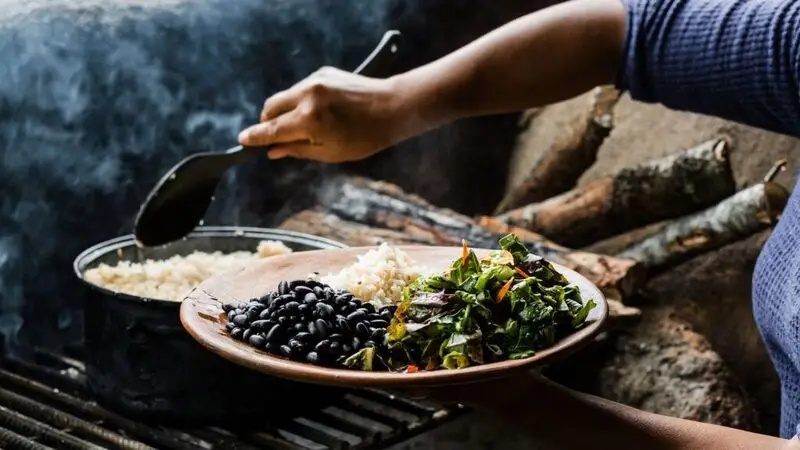
- While colorectal cancer is highly treatable at its earliest stage, most cases are found when it is more advanced.
- Between 7% and 29% of people who receive treatment for colorectal cancer experience recurrence within five years.
- Certain lifestyle changes, such as a healthy diet, can help prevent colorectal cancer.
- Researchers recently found that adding navy beans, also known as haricot beans, to the diet of colorectal cancer survivors helped improve their gut microbiome, which could aid in both cancer prevention and treatment.
Colorectal cancer — which affects the large intestine, including the colon and the rectum — is the third most common cancer in the world.
Colorectal cancer is highly
However, colorectal cancer does not always show symptoms at an early stage. Only about three to four out of 10
If treatment is successful for colorectal cancer, recent research shows that despite improvements in treatment
Although it is not possible to fully prevent colorectal cancer, past studies show regular
Now, researchers from The University of Texas M.D. Anderson Cancer Center has found that adding navy beans, also known as haricot beans, to the diet of colorectal cancer survivors helps improve their gut microbiome, which could potentially aid in both cancer prevention and treatment.
While other dry beans, peas, and lentils have nutritional profiles that are also likely to stimulate the gut microbiome, Dr. Carrie Daniel-MacDougall, associate professor of epidemiology at The University of Texas M.D. Anderson Cancer Center and lead author of this study told Medical News Today she was particularly inspired by
“These studies, including my own, were also inspired by the Polyp Prevention Trial (PPT),” Dr. Daniel-MacDougall said.
“This large study showed that the participants with the biggest increase in bean consumption — daily or close to it — had a lower risk of advanced colorectal adenoma recurrence — a type of precancerous and high-risk polyp that is very likely to progress to colorectal cancer if not caught promptly upon colonoscopy and completely removed,” she continued.
“At the time of the PPT, pinto, navy, and black beans were the most commonly consumed beans and varied in popularity by U.S. region. Here in Texas, I knew navy beans would also be ‘new’ to participants and have a mild/adaptable taste, making them well-suited to test in a controlled and consistent manner over eight weeks,” she added.
Dr. Daniel-MacDougall said it is important for colorectal cancer survivors to have a balanced gut microbiome because it directly interacts with the colon epithelium where colorectal cancer develops.
“This ‘cross-talk’ between human cells and microbes is tightly linked to the immune system that can either prevent or drive inflammation, as well as the development and progression of cancer,” she continued.
“Having made it through the difficult journey of cancer, survivors certainly want to avoid other major and debilitating health issues,” Dr. Daniel-MacDougall added.
“Colorectal cancer recurrence, cardiovascular disease, and other chronic conditions share a common cluster of modifiable risk factors related to diet, obesity, and inflammation where the gut microbiome plays a central role.”
— Dr. Carrie Daniel-MacDougall
Previous research has also shown the gut microbiome’s important role in colorectal cancer. A study published in July 2023 suggested the gut microbiome may be a target for
A study published in June 2020 found that
For this study, Dr. Daniel-MacDougall and her team randomized 55 male and female study participants over the age of 30 who had a history of bowel lesions, had a history of colorectal cancer, and/or were at high risk for precancerous polyps, 48 (87% completed the study).
For eight weeks, participants were asked to either follow just their normal diet or add a daily cup of organic, canned, pressure-cooked white navy beans to their diet.
The health benefits of navy beans“Navy beans are rich in dietary fiber and an excellent source of plant-based protein. They specifically contain multiple prebiotic or microbiota-stimulating nutrients, including oligosaccharides and the amino acid lysine. Navy beans also contain other anti-inflammatory micronutrients and antioxidants, such as the flavonoid apigenin.”
— Dr. Daniel-MacDougall
Researchers discovered that participants who consumed navy beans each day experienced positive changes to their gut microbiome. These changes included an increase of
“While some doctors may be comfortable having conversations with their patients about living a healthier lifestyle, exercising, and eating more fruits and vegetables and less red and processed meat, beans are often less likely to come up in conversation and may be a harder sell in a population with a history of bowel lesions or bowel issues,” Dr. Daniel-MacDougall said.
“Through the results of this trial and other supportive evidence, I hope beans will regularly come up in these conversations and that more doctors and patients will consider the value of whole foods to achieve a broader impact on health,” she added.
MNT also spoke with Dr. Anton Bilchik, surgical oncologist, chief of medicine, and director of the Gastrointestinal and Hepatobiliary Program at Saint John’s Cancer Institute in Santa Monica, CA, about this study.
Dr. Bilchik said he felt this study was extremely important and relevant since a person has between 2 to 3 trillion bacteria within their body, and there is substantial evidence that those bacteria play an important role in preventing both cancer and cardiovascular disease.
“We also have good bacteria and potentially bad bacteria. And so if we can stimulate the good bacteria to impact the immune system to prevent cancer or cancer recurrence through diet, that would be extremely important,” he stressed.
Dr. Bilchik also said it is essential for physicians to talk to their colorectal cancer patients about gut health, given the enormous amount of new information regarding the bacteria and how diet can influence the bacteria.
Processed foods and colon cancer“For example, it’s well known that there’s a high incidence of colorectal cancer in patients that ingest processed food, red meat, (and) charred meat. And the fact that there are healthier foods that can stimulate bacteria to prevent cancer or to prevent cancer recurrence is extremely important because the other foods, such as processed food, may be stimulating the bad bacteria to increase the risk of colorectal cancer and cancer current.”
— Dr. Anton Bilchik
“So diet and nutrition should be an extremely important part of the discussion, both in the prevention of colorectal cancer, but also in those patients that have been diagnosed with colorectal cancer that are undergoing treatment to prevent the chance of it coming back,” Dr. Bilchik added.





